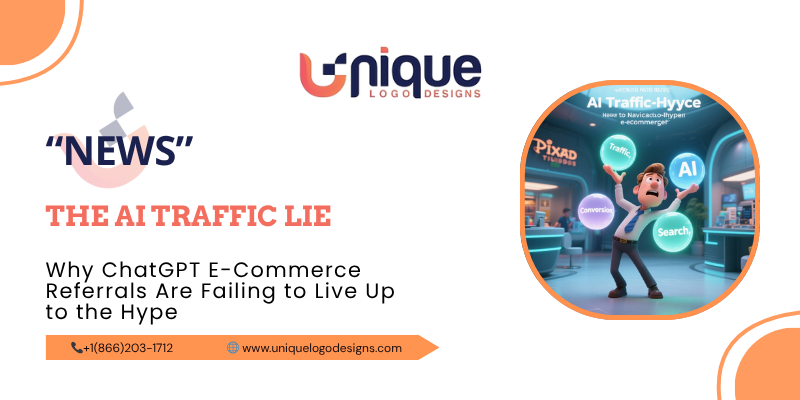How to Navigate the AI Traffic Hype in E-Commerce
E-commerce marketers are bombarded with bold claims about conversational AI: “Optimize for ChatGPT now, or get left behind.” Agencies assert, “LLM traffic converts better than search.” Some even warn, “AI will kill Google.”
But a new, rigorous academic study cuts through the noise: the AI traffic revolution isn’t here yet.
The research paper titled “ChatGPT Referrals to E-Commerce Websites: Do LLMs Outperform Traditional Channels?” by Maximilian Kaiser (University of Hamburg) and Christian Schulze (Frankfurt School of Finance & Management) analyzed 12 months of first-party data from 973 e-commerce websites generating a combined $20 billion in annual revenue.
Key Findings: The Performance Gap Nobody’s Talking About
- ChatGPT referral traffic (organic LLM) was less than 0.2% of all sessions—about 200 times smaller than Google organic. Over 90% of LLM e-commerce traffic originated from ChatGPT, outperforming other LLMs by a significant margin.
- Within that small volume, ChatGPT accounted for over 90% of all e-commerce traffic coming via LLM platforms—far outpacing competitors like Google Gemini (2.6%), Microsoft Copilot (2.1%), Perplexity (4.1%), DeepSeek (0.07%), and Grok (0.02%).
- LLM traffic lagged most traditional channels in conversion rate, average order value, and revenue per session—performing worse than all except paid social.
- Affiliate marketing conversion rates were approximately 86% higher than those from ChatGPT referrals; organic search outperformed ChatGPT by around 13%.
- ChatGPT sessions had low bounce rates, but fewer pages were viewed and sessions were shorter—suggesting that discovery occurs via ChatGPT, but purchases often occur on search or through direct channels.
- Although conversion rates from LLM referrals improved over time, the average order value declined, resulting in a failure to catch up in revenue per session. Even optimistic projections suggest that parity with organic search is unlikely within the next year.
Why This Matters for E-Commerce Marketers
The study sends a strong signal: if your agency is pushing ChatGPT referral optimization as a near-term game-changer, be cautious.
Practical implications:
- Consider ChatGPT traffic experimental; its volume and performance still trail those of established channels.
- Continue investing in proven channels, such as organic and paid search, email, and affiliate programs, that consistently drive ROI.
- Recognize that ChatGPT aids discovery, but customers often purchase through traditional channels, which may miss AI’s influence.
- Optimize product pages for deep links from AI traffic to maximize conversions.
- Prioritize long-term brand visibility; being mentioned by AI tools can build future awareness, even with low current conversions.
What’s Next for LLM Commerce
Researchers emphasize that AI-driven commerce is in its early stages and that future developments could significantly change the current landscape.
Key takeaways for the future:
- LLM-driven commerce is likely to evolve into a model where AI assists in product discovery, followed by purchase through traditional search, suggesting a gradual and integrated transition rather than abrupt disruption.
- As AI platforms begin to integrate affiliate or paid-link systems, brand citations could translate directly into revenue, underscoring the need to monitor these future changes.
- Metrics to track moving forward include changes in average order value and whether users are increasingly transitioning from verifying products on Google to making direct purchases via AI platforms, which offer signals of ongoing market shifts.
In short: yes, ChatGPT sends traffic, but it’s not yet replacing Google or traditional channels. The “AI will kill search” narrative remains hype—not reality.
The Bottom Line
This large-scale research decisively debunks the myth that AI referrals currently outperform established marketing channels. The data is clear: organic search, affiliate marketing, and email still dominate e-commerce conversions.
Marketers must stay disciplined: trust the data, continue testing, and avoid being sidetracked by hype. Redirect your budgets only when the evidence supports it.
Disclaimer:
Some content in this article is based on academic and media sources, including the study “ChatGPT Referrals to E-Commerce Websites” (Kaiser & Schulze, 2025) and industry coverage from Search Engine Land, Modern Retail, Digiday, and PPC Land. This material is provided for informational purposes only and does not constitute marketing or investment advice.

